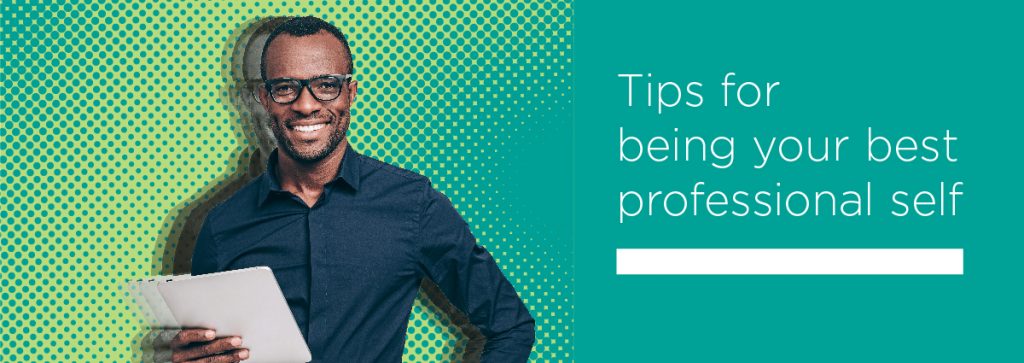
By: Jennifer McMillen Smith, LISW-S, HIV Social Worker at MetroHealth Medical Center and medically reviewed by Ann K. Avery, MD, Infectious Disease Physician at MetroHealth Medical Center
Getting a job that is meaningful to you — and keeping it — is a big part of life. After all, you gotta pay the bills somehow! Having a successful career isn't just about finding the right job though, it’s also about knowing how to present your best self in a professional manner. You might call this building your brand, the way people see and come to understand you in whatever career your make for yourself. Being your best professional self will help ensure your employer and business partners put a high value on you– and it’s key to getting promotions and raises along the way.
So what does being a professional look like? Simply put, being professional is about taking responsibility, being reliable, and giving your best to get the job done and done well. Can that really be all there is to it? Well, no, but it’s a good place to start. While every workplace is a little different in terms of their norms and acceptable behavior, certain behaviors are at the foundation of what it means to be professional.
Showing up
Have you ever heard that saying, “Half of the battle is just showing up?” Well, this definitely applies to work. Whether it’s an interview or a regular day on the job, showing up is a huge factor that plays into workplace etiquette and overall job performance. It means you can be count on to be there when you say you will.
Sure, there may be days that you’re sick or unable to make it into work unexpectedly and that’s cool, just be sure to give your boss a call and let them know. If you don’t show up and don't tell your manager about it, it’s considered a “no call, no show.” These tend to leave a bad impression and taint your professional image.
If you have a conflict that’s scheduled for a few weeks from now, like a doctor’s appointment, try to give your manager as much heads up as possible. This shows you’re responsible and thinking about the rest of the team and how they may need to fill in for you.
Being on time
Part of showing up is being on time. There’s a popular saying, “If you’re not 15 minutes early, you’re late.” Some people might call this going the extra mile, but it doesn’t hurt to try.
Setting yourself to run early means that even if something comes up along the way to work (road closures, traffic, forgetting something at home) you can still get there on time. And it helps you to stress less on your commute!
Attire
When it comes to dress code, each job and industry is different. Some have set uniforms, some have strict dress codes, and some trust their employees to use their best judgement.
If you’re not sure what the dress code is at your workplace, ask one of your supervisors or ask to have a copy of the employee handbook to find out.
Some places have dress-down days on Fridays, where you might see people being a lot more relaxed about the dress code. Make sure you check first though.
Unless you hear otherwise, we suggest avoiding jeans, flip flops, and t-shirts.
When in doubt, a good idea is to model your attire after your boss or one of your co-workers wear. Sometimes, overdressing can send the message that you take your work seriously and take pride in your appearance.
Come join our private, stigma-free, supportive community.
Health management tools with medication & appointment reminders.
Social networking in a community conversation & private chats.
Make a good first impression—but don’t stop there
Being professional isn't just impressing your boss, it’s about having the best possible work experience with all the people you might meet—co-workers, customers, you name it.
Research suggests that all it takes is 7 seconds to form a first impression of someone. Make those first moments count by smiling and being friendly. Keep the friendliness train going by finding ways to be helpful for other people, whether it’s a coworker or a customer. Holding the door for people or offering to help with a task shows you’re willing to go the extra mile, and it helps other people get to know you.
Part of leaving a good impression on people also means being courteous to others you work around. For example, if you’re bringing in lunch, either don't pack something smelly (hard boiled eggs, tuna, fish, etc.) or if you do, you might consider heating it up somewhere away from where others are working.
Communication
Another big part of workplace etiquette is communicating in a professional way. In general, you might want to avoid swearing and cursing, as well as any other language that could be deemed inappropriate or disrespectful.
Certain topics are sometimes best left undiscussed too, like any crazy times you’ve had with friends, drinking, drugs, sex, and sometimes even relationships. It’s also a good idea to be cautious before engaging in any religious or political discussions. That doesn’t mean you can’t stand up to discrimination and racism when you see it though. That kind of behavior is report worthy and has no place in a professional environment (or in society in general)!
As a general rule of thumb, it’s a good idea to avoid a topic at work if it’s not something you’d be comfortable talking about in front of your parents or grandparents.
This applies to written communications, too – try to make sure any texts and emails with your boss, co-workers, business partners, and customers are as professional as possible.
Respect
Respect is a huge part of professionalism and adulthood in general. Gossiping or talking negatively about other people you work with can come back to hurt you, since word can travel quick in a workplace.
Think of it this way, you were hired to be a part of the team (aka the company) to achieve a common goal or mission. Everyone — from the owner and CEO all the way to the janitor or receptionist — has an important role to play in reaching those goals and contributes to the team’s well-being.
Phone use
In general, it’s not a good idea to be on your phone while at work. Think about putting it on silent and not checking it while you’re working. Save all the scrolling for a lunch break or after your shift. If you have to make a call, consider doing it in private or excusing yourself to the restroom.
If you’re at a job that requires you to work with email, there are some best practices that can help you come off as more professional:
- Use “Hello” or “Hi” instead “Hey” and “Yes” instead of “Yeah.”
- Introduce yourself if it’s not someone you’ve spoken to before.
- When writing emails, write with proper capitalization, punctuation, and grammar. (Don’t email like you text: avoid“lol” or “btw.” Spell things out.)
- Include a subject line and a greeting like, “Hi Joe,” before starting your message.
Professionalism summed up
At the end of the day, being a professional will improve your work performance and leave a better impression among all those you come into contact with. Putting these tips into practice will help you to build your image (your brand) in the workplace and assert yourself as a the one and only professional you.
Related Blogs:










